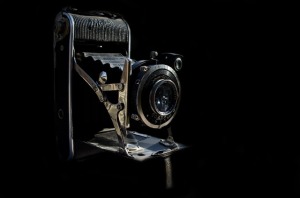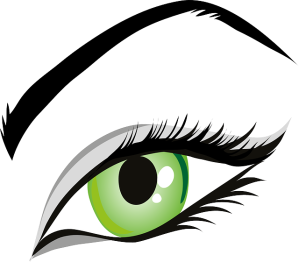
It was a small studio. Stuffy by most standards, and the decor was by no means interesting. Gerald wondered why they were even bothering to film this interview, but the boss said she wanted it for the website if it turned out well. Gerald didn’t even know why they were doing the interview at all. He wiped the slight perspiration from his bald spot and dried his hand on the pants of his tweed suit as he reviewed his materials. He gave a passive nod to the cameraman as he passed him, moving towards his seat.
“Afternoon, Dave.”
“Good afternoon, Gerry.”
“It’s Gerald, Dave.”
The cameraman smiled. Gerald rolled his eyes.
With a final glance at his clipboard of notes, Gerald took a seat and looked over his subject, who was sitting quietly across from him. Gerald had to hold back a sneer. He had seen his type before, and he was not a fan. He wasn’t even a sympathizer.
“You must be Peter,” he said, reaching a hand out, not bothering to rise or smile. Peter didn’t smile, but he rose out of his seat to shake Gerald’s hand. “I’m Gerald, Gerald Thomas,” he continued.
“Glad to meet you, Gerald.”
As they shook hands, the interviewer judgmentally glanced over his subject once again. Peter’s hair was a black mess of medium-length locks that looked as if they had been randomly assembled on top of his head. His complexion was very pale. He was skinny. He didn’t look thirty-two, like he was supposed to be. He wore tight-fitting pants, not unbecoming of the occasion, but something seemed off about them to Gerald. Peter’s shirt, of course, was one from his own line. It had the words “You may think you’re” and then a graphic of a garbage can, then the words “but you’re a” followed by an open treasure chest spilling with gold.
Gerald did not understand the point of this interview. He worked for a business trends magazine for goodness sake. Then again, he failed to see the value in most of his articles. He had been meaning to search out a new job for some time now. One with a better boss.
“Is the camera on, Dave?” Gerald asked as Peter returned to his seat. Dave gave him the thumbs up. There was no one else in the little studio. The red light on top of the camera blinked.
“Have you ever been interviewed before, Peter?”
Peter leaned forward and rubbed his hands together, nodding.
“Lots of times this past year and a half. Never on camera. Usually it’s on the phone, or in person, but for a newspaper or something.”
Gerald smirked.
“Well, it isn’t much different here. We’ll film everything and edit if we need to. If we end up using the video.”
Peter nodded and Gerald held his clipboard up and looked at the information he had been given. It made him uncomfortable to look at his interviewee. He tried to keep his eyes occupied on the page.
“So, Peter,” he began. “Heal Apparel.”
Peter slowly moved his head, expecting more of a question. Not receiving it, he hesitantly spoke.
“That’s my company, yeah.”
“You’ve been running it for how long now?”
Peter dipped his head and shook his messy hair.
“Four-ish years now. The company started with just me and a battered screening machine, but ‘Heal’ started adding people about a year later. It only started getting big about a year and a half ago.”
“Hmm,” Gerald grunted. He glanced up, then shifted his position in his chair, still averting his eyes. “Yes, your designs have seen a great deal of popularity the last few quarters, so much to the point that there are now knock-off brands selling similar, sometimes identical products to your own. How do you respond to this?”
Peter shrugged, then laughed.
“Hey, man, if they want to spread the word for us, that’s fine by me. It’s about the content anyway. If the knock-offs are saying the same kind of things as we are, then that’s great. We want people wearing these kinds of clothes.”
Gerald flipped through the sheets on his clipboard, making Peter wait awkwardly while he fished for a new question. His throat fell into folds as he looked down at his information.
“You’ve experienced quite a rise in popularity the last few quarters- your clothes have. What do you attribute this to?”
Peter’s countenance turned pleasant and he leaned forward again, rubbing his hands together.
“The message, Gerry. It’s all about our message. We’re trying to spread some truth, you know? That’s what we started this thing for.”
Gerald grunted again, flipping through the pages on his clipboard so he still did not have to look at his subject.
“You have some rather provocative designs,” he said, widening his eyelids, then whistling. He glanced at Peter momentarily, then returned to his pages. “Here’s a shirt with a graphic of a noose, a spilling bottle of pills, and a knife. The text reads ‘We all have our demons.’” He looked up at Peter incredulously.
“Yeah, but there’s something on the back, too. It says that-”
“Here’s one,” Gerald continued, interrupting, “that reads, ‘Show me your scars and I’ll show you mine; Man is broken, but heaven heals.’”
Peter nodded.
“It’s from a piece of poetry. My design partner found it when he was-”
Gerald interrupted again, shocked at what he felt was the extremely poor taste of the designs he saw in his packet. He had read a few sentences about Peter’s company, but he hadn’t actually bothered to look at the shirts until the actual interview.
“This one just has a picture of hands covered in blood with the words, ‘Clean hands are given, not earned.’”
Peter nodded again, leaning back into his seat.
“On that one we wanted to-”
For the third time, Gerald Thomas interrupted his subject. He removed his reading glasses and spoke in a higher register than he typically did. He made only small efforts to hide his indignation.
“What sort of message are you spreading, Peter? What is the purpose behind this macabre and sickening drivel that you put on t-shirts?”
The cameraman peeked his head around from behind the viewfinder, confused by Gerald’s hostility. Gerald knew that he had crossed the line from unbiased interviewer, but he didn’t care. They could edit it later, and he wanted the punk across from him to know that not everyone worshiped the trash that his company produced.
Peter cocked his head a quarter turn.
“Do you want to know, Gerry? Because I’m starting to wonder if you don’t.”
“Oh, please,” Gerald said. “Of course I want to know. We’ll phrase it nice for the boys and girls at home. What was your purpose in finding this company, Peter Harlow? What prompted you to come up with such innovative and cutting edge designs?” Gerald’s voice was dripping with sarcasm, but it didn’t matter. The interview would appear in print, but not on the website. In writing it wouldn’t look bad once he was done with it.
Peter scratched at the back of his head, unamused with his interviewer’s tone, but trying to decide how to best respond.
“Well, whatever the way you asked, you asked, so I’ll tell you. We started this company for everyone who thinks they’re alone. For the kids who find a safe place to hide and hold their knees to their chest while they shake. For people who are so caught up in the chains that they hold onto and that bind them to where they can hardly breathe.”
“For the perpetual boy-men who have a disturbing obsession with the unpleasant?” Gerald scoffed. “What a bunch of emo crap.” Gerald checked himself. He ignored Dave’s disbelieving stare, but he knew that he had to rein it in. Even he couldn’t make these kinds of comments look passable in his article. “What I meant to say,” he continued, speaking so as to record a different response, “was… continue, please. Why did you start this company?”
Peter shook his head, and then he looked sympathetically into Gerald’s glazed-over eyes. His manner was grave, and his voice dropped in volume.
“I grew up in a screwed up house, Gerry. Nothing uncommon, I guess, but not good. I used to go out with my friends any time I could just to get out. It didn’t matter what they wanted to do or where they wanted to go, I’d go. Skate park, strip mall, strip club, baseball, church- I didn’t care. I went all sorts of places, had some random memories. Just wanted to get out. I hated life. Hated myself. It felt like a crushing weight was bearing into my chest every second of the day. That’s frustrating. Frustration only adds to the pain. Added pain means more frustration. I got real deep into what people in pain do, real fast. I started drinking at the age of eight. Started cutting at age nine. Fill in the blanks wherever else, you’re probably right.”
Gerald leaned backwards in his chair. He looked disgusted.
“By ‘cutting,’ you mean…”
“Slashing my wrists,” Peter said, gesturing absent-mindedly with his hands. “Yeah.”
Gerald looked suspicious, but before he spoke he remembered that he needed to phrase things in a certain way for the transcript.
“Why would you do something like that?” he asked.
Peter shrugged.
“Felt good. Felt like a distraction. Wanted to hurt myself, I guess. Lots of reasons.”
Gerald squinted, as if his subject made no sense. He suddenly chuckled and threw up one of his hands.
“I guess I just don’t see the allure.”
Gerald’s mirth was not matched in Peter. The younger man steadily held his gaze, his features patient with the interviewer, but sad also.
“A knife can be the best looking thing in the world, man. You have to be pretty deep in to know. But when you’re in that place… it feels like release. It feels really good. It’s super addicting. The only problem is that it’s psychotic.”
Gerald chuckled again. He began looking around as if he thought someone was playing a joke on him. No one was.
He looked back at his subject as if to coax him into smiling and admitting that he was pulling his leg. Peter continued to regard him evenly, if sadly.
“You don’t make any sense, Peter. How can a knife in your skin feel good?”
“It’s perverse, for sure, but it does. At least when you’re in that place. It’s empty and horrible, but it makes such promises when you’re staring at the blade, thinking about it. It’s like doing something you know you’re gonna regret, but lusting after it anyway. It’s like jacking off, or-”
“Whoa, what the Hell?” Gerald demanded. He waved at his cameraman. “We’re definitely editing this.”
“What are you talking about?” Peter said, visibly angry for the first time. “I’m not just being vulgar here, you asked me what it’s like; this is real stuff.”
“You can’t expect me to put that in a magazine, kid. Certainly not on our website.”
Peter shook his head, sighing to calm himself.
“Skip that part, then. The point is that it’s a temptation, man. It makes big promises of relieving your pain, of bringing pleasure, but it ends up being a trap, and so empty. It swallows you up.” Peter rubbed his arm self-consciously. “Anyway. One day when I was twenty-something, doing nothing with my life, something happened.” He shook his head. “I forget what. Wasn’t anything exceptionally horrific, I don’t know. But it was bad enough to be a trigger. I pulled out a razor blade and started slashing.” Gerald pushed back into his chair visibly repulsed, but Peter’s eyes were far away. He didn’t notice. “As I was cutting myself,” he continued, slowly. His voice trembled. “I looked down at my arms… and I saw the shape of a cross.” He paused, then, and in that tiny room it seemed as if all the world was listening. He grasped for the right words with obvious passion. “It’s not like it’s an uncommon shape or anything. Pretty easy for two lines to make it. I still have the scar,” he said, rolling up his sleeves and showing his forearms and wrists to Gerald, who frowned. Peter’s wrists were scarred up and down, many, many times. It looked like chicken scratch. “And as I stared at that mark, it got me thinking. Pictures of all those times my junior high buddies took me to some church ran through my head. I remembered the things they were always talking about, about a man and a cross, and then it hit me…” Peter looked up at Gerald with conviction in his unwavering eyes. “Jesus’ wrists bled so mine don’t have to.”
“Alright,” Gerald said quickly, waving his hands. His chin was tucked down so as to prevent himself from becoming nauseous. “This isn’t a faith piece.” Peter just continued talking.
“I did some research,” he said. “A lot of people think that the nails that went into Jesus’ hands were actually right here, in his wrists. Between the ulna and radius.”
“This isn’t a faith piece,” Gerald repeated, closing his eyes and waving away Peter’s words. He started to rise.
“It isn’t a faith piece!” Peter replied, passionately, but controlled. “You asked me what happened and so I’m telling you. Why I started my company.”
Gerald shuddered, then looked at his watch.
“You have two minutes.” He remained standing instead of returning to his seat. Peter didn’t seem to mind.
“When I had been a kid hanging out at some church, they used to talk about Jesus knowing our pain, taking our punishment, but I didn’t know what that meant yet. In that moment on the floor of my crappy apartment, I knew.” Peter held out his badly scarred flesh. “My wrists are clean.”
Gerald eyed Peter suspiciously, gesturing hesitantly with his clipboard.
“They’re not.”
Peter smiled a bittersweet grin that made chills run down Gerald’s back, as if something profound had happened.
“They are now,” he said. “I never cut another day in my life after that. I started this company so that people who are still in that place would know that they’re not alone. That there’s hope. That you can stop. Crap like that thrives in the darkness, but when there’s truth put in a way that they can understand, that stuff just crumbles away.”
“Great, thank you,” Gerald said stiffly, practically snatching Peter’s hand for a handshake. It was obvious that Peter wasn’t finished. It was even more apparent that Gerald was.
“You don’t have any more questions?” Peter asked, standing as he watched Gerald head for the door.
“Nope,” the interviewer replied, avoiding eye contact. “Thanks for your time.”
The door shut behind him, and Peter looked to the cameraman, Dave, who shook his head. The little red light on top of the camera went dim.
All the way home Gerald tried to think of a way to convince his boss that they shouldn’t run an interview about Heal Apparel. When he went to bed that night he buried the interview under layers and layers of defenses in his well-trained mind. He slept, but fitfully, as he always did.


